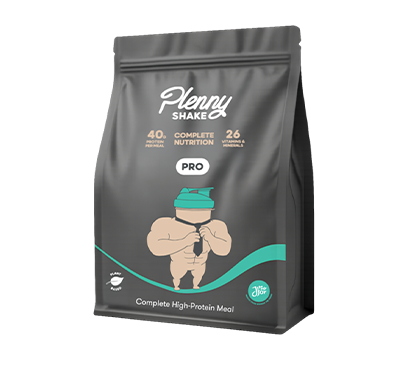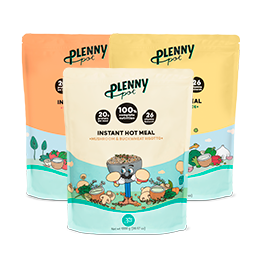Introduction Jimmy Joy Plenny Drink v2.1

Plenny Drink is an easy and nutritionally complete vegan meal that contains a balanced macro split (high in protein, a source of fiber, low in sugar and salt). It also contains the 26 essential vitamins and minerals your body needs to stay healthy.
Just shake and enjoy!
Plenny Drink comes in Vanilla and Chocolate flavors and provides you with 400 calories: 20% protein, 34% fat, 45% carbohydrates and 3% fiber.
Nutritional breakdown
Per serving of Plenny Drink 2.1 Vanilla
|
Nutrition |
Worth |
|
Energy |
400 kcal/1674 KJ |
|
Fat |
15 g |
|
Of which saturated fats |
1.0 g |
|
Carbohydrates |
45 g |
|
What sugar |
6.9 g |
|
Fibers |
5.9 g |
|
Proteins |
20 g |
|
Salt |
0.83 g |
Ingredients
- Water
- Soy protein isolate
- Oatmeal
- maltodextrin
- Modified starch (tapioca starch)
- rapeseed oil
- oat fiber
- Emulsifier: soy lecithin
- Thickener: Microcrystalline cellulose, Carboxymethylcellulose, Guar gum
- Blend of vitamins and minerals
- Aroma: vanilla seeds / fairtrade cocoa powder
- Sweetener: sucralose
Protein
Proteins are the building block of essential compounds in your body, such as hormones and enzymes, and they give your body its structure (1,2). Since we cannot do without this nutrient, we solved this problem for you by making Plenny Drink high in protein. A minimum of 0.83 grams of protein per kg of body weight per day is recommended (1). Plenny Drink provides you with 20 grams of protein per serving in the right ratio of amino acids, making it suitable for even the most active people among us. The main source of protein in the product is soy protein, which provides you with the following amino acid profile:
Per serving (330 ml)
|
Amino Acids |
Mg per serving* |
% of WHO recommended daily intakes** |
|
Alanine |
860 |
- |
|
Arginine |
1520 |
- |
|
Aspartic acid |
2310 |
- |
|
Glutamic acid |
3800 |
- |
|
Glycine |
830 |
- |
|
Histidine |
530 |
76% |
|
Isoleucine |
990 |
71% |
|
Leucine |
1620 |
59% |
|
Lysine |
1250 |
60% |
|
Methionine + Cysteine |
520 |
50% |
|
Phenylalanine + Tyrosine |
1820 |
104% |
|
Proline |
1020 |
- |
|
Serine |
1060 |
- |
|
Threonine |
760 |
72% |
|
Tryptophan |
260 |
93% |
|
Valine |
990 |
54% |
*latest laboratory results
**based on an average adult (70kg). Requirements are determined by the person's weight.
Fats
Fats are an important nutrient, mostly known for protecting you from the cold in the winter. But fat has an even bigger and more positive role in your body, such as being the building blocks of your cells and making your brain and muscles work well (4,5). When you want to benefit from the pros rather than the cons of this nutrient, two things need to be taken into consideration: the amounts and the sources.
The fat content in Plenny Drink contributes to 34% of its total energy, which is right in the middle of the recommended 20-40% (6,7). Oats and soy provide some fat in Plenny Drink, but the main source is rapeseed oil, which contributes to good health. How? Rapeseed oil is low in saturated fatty acids. Saturated fatty acids (SFA) are linked to high cholesterol and blockages in the arteries and should therefore be as low as 10% of total energy intake (7). Adding rapeseed oil to Plenny Drink ensures that the amount of SFA does not exceed 2 E%. But there is more! Rapeseed oil is rich in omega 9 and has an excellent ratio between the content of α-linolenic acid (ALA) and linoleic acid (LA). These beneficial polyunsaturated fats (PUFs), better known as omega-3 and -6 fatty acids, are linked to preventing heart disease and stroke. Unfortunately, your body can’t produce them, so they’re essential in your diet (5,7). Each Plenny drink contains 1320 mg of omega-3s.
Carbohydrates
Carbohydrates can be divided into 3 categories: fibers, sugars and starches, the latter providing glucose to your body. Glucose is the main source of energy for the brain and therefore essential in your diet (8). The Institute of Medicine (IOM) has established a required daily intake of 130 grams per day for adults to provide this fuel to the brain (9). According to EFSA, total carbohydrate intake should range between 45-60%E, which means 225-300 grams of carbohydrates per day to cover all your body's requirements. Plenny Drink contains 45 grams of carbohydrates per meal, making a diet based solely on these meals provide you with a sufficient amount of this nutrient.
After digestion, carbohydrates cause your blood sugar level to rise. One tool to measure this blood sugar response is the glycemic index, with carbohydrates that are easy to digest being high and those that are more difficult to digest being low (10). Plenny Drink gives you the perfect combination of these sources, which are maltodextrin, tapioca starch (modified starch) and oats. Why this combination? Maltodextrin is easy to digest and therefore a quick source of energy for the brain (11). You can read more about maltodextrin in this blog post. The complementary carbohydrate sources, tapioca starch and oats, have been added to make sure your blood sugar level doesn’t spike. Tapioca starch is a resistant starch, meaning it is harder to digest. This results in a lowering effect on the glycemic index and makes you feel more satisfied after a meal (12). This increased satiety is also due to oats, which are rich in beta-glucan fiber, which slows down digestion (13).
What about sugar? A diet based solely on Plenny Drink contributes to a sugar content of 7% of total energy intake, which is below the upper limit of 10E% sugar. The WHO strongly recommends this upper limit for a healthy diet (14).
Fiber
To ease your digestive system, a little extra fiber has been added to Plenny Drink in amounts of 5.9 grams per serving. This amount is based on recommendations from authorities such as the Dutch Health Council and the American Heart Association, which define 30-40 grams of fiber per day or 25 grams of fiber in a 2000 calorie diet (15,16). Plenny Drink contains 30 grams of fiber per 2000 calories, making it easy for you to tick that box!
Micronutrients
We also provide you with the perfect amounts of micronutrients, including vitamins and minerals. Small but mighty! Micronutrients play a role in the proper functioning of the nervous system, blood circulation and immune system. A deficiency of these nutrients is therefore linked to a higher likelihood of disease (17). But don’t worry, we’ve got your back! The amount of micronutrients added to Plenny Drink ensures that you consume at least 100% of the reference daily intake of an average adult (18) (by consuming 2,000 kcal of Plenny Drink).
In addition to the nutritional benefits of Plenny Drink, they get their flavor from the natural cocoa powder and vanilla seed we add! Can't wait to try them? Order them here .
|
Vitamins-Minerals by |
330 ml*** |
RI |
|
|
Calcium |
185 |
mg |
23%* |
|
Phosphorus |
140 |
mg |
20%* |
|
Magnesium |
75 |
mg |
20%* |
|
Potassium |
400 |
mg |
20%* |
|
Chloride |
279 |
mg |
36%* |
|
Iron, total |
3.2 |
mg |
23%* |
|
Zinc |
2.0 |
mg |
20%* |
|
Copper |
0.40 |
mg |
40%* |
|
Manganese |
1.0 |
mg |
50%* |
|
Selenium |
18 |
μg |
33%* |
|
Chrome |
8 |
μg |
20%* |
|
Molybdenum |
13 |
μg |
26%* |
|
Iodide |
30 |
μg |
20%* |
|
Vitamin A |
160 |
μg |
20%* |
|
Vitamin D |
5.0 |
μg |
100%* |
|
Vitamin E |
4.0 |
mg |
33%* |
|
Vitamin C |
40 |
mg |
50%* |
|
Vitamin K |
16 |
μg |
21%* |
|
Thiamine |
0.40 |
mg |
36%* |
|
Riboflavin |
0.32 |
mg |
23%* |
|
Niacin |
3.6 |
mg |
23%* |
|
Vitamin B6 |
0.40 |
mg |
29%* |
|
Folic acid |
60 |
μg |
30%* |
|
Vitamin B12 |
3.2 |
μg |
128%* |
|
Biotin |
10 |
μg |
20%* |
|
Pantothenic acid |
1,2 |
mg |
20%* |
* % of the daily reference intake for vitamins and minerals
** Reference intake for an average adult (8400 kJ/2000 kcal)
*** 1 serving = 330 ml
Fairtrade cocoa for Plenny Drink Chocolate
We use fairtrade cocoa for Plenny Drink v2.1 Chocolate.
More sustainable packaging
We use plant-based bioplastic for the Plenny Drink lid.
Official Nutri-Score A
Plenny Drinks gets an A in the Nutri-Score table. And yes, that is the highest score.
Sources:
- WHO | Protein and amino acid requirements in human nutrition [Internet]. WHO. World Health Organization; [cited 2020 Apr 7].
- Pendick D. How much protein do you need every day? [Internet]. Harvard Health Blog. 2015 [cited 2020 Apr 9].
- Waarom hebben vegetariërs en veganisten meer eiwit nodig? | Voedingscentrum [Internet]. [cited 2020 Apr 7].
- Boston 677 Huntington Avenue, Ma 02115 +1495‑1000. Types of Fat [Internet]. The Nutrition Source. 2014 [cited 2020 Apr 9].
- Publishing HH. The truth about fats: the good, the bad, and the in-between [Internet]. Harvard Health. [cited 2020 Apr 9].
- Vetten | Voedingscentrum [Internet]. [cited 2020 Feb 19].
- WHO | Fats and fatty acids in human nutrition [Internet]. WHO. World Health Organization; [cited 2020 Apr 7].
- Slavin J, Carlson J. Carbohydrates1. Adv Nutr. 2014 Nov 3;5(6):760–1.
- Medicine I of. Dietary Reference Intakes for Energy, Carbohydrate, Fiber, Fat, Fatty Acids, Cholesterol, Protein, and Amino Acids [Internet]. 2002 [cited 2020 Apr 9].
- Publishing HH. A good guide to good carbs: The glycemic index [Internet]. Harvard Health. [cited 2020 Apr 9].
- Hofman DL, van Buul VJ, Brouns FJPH. Nutrition, Health, and Regulatory Aspects of Digestible Maltodextrins. Crit Rev Food Sci Nutr. 2016 Sep 9;56(12):2091–100.
- Ask the Expert: Legumes and Resistant Starch [Internet]. The Nutrition Source. 2015 [cited 2020 Apr 9].
- Oats | The Nutrition Source | Harvard TH Chan School of Public Health [Internet]. [cited 2020 Apr 9].
- Guideline: sugars intake for adults and children [Internet]. [cited 2020 Apr 9].
- Whole Grains, Refined Grains, and Dietary Fiber | American Heart Association [Internet]. [cited 2020 Apr 9].
- Kromhout D, Spaaij CJK, de Goede J, Weggemans RM. The 2015 Dutch food-based dietary guidelines. Eur J Clin Nutr. 2016 Aug;70(8):869–78.
- Publishing HH. Micronutrients have greater impact on health [Internet]. Harvard Health. [cited 2020 Apr 9].
- Council of the European Union. on the provision of food information to consumers [Internet]. EU: European Parliament; 2011 [cited 2020 Apr 9].




















